- HOME
- /
- Better Living
- /
- Parenting
- /
Building Compassion
Help your child grow up to be more inclusive

Every Monday, a student in the school where I work would pretend to fall ill. We later discovered she wasn't bunking, just trying to avoid reading aloud during the library period. She didn't want her classmates to laugh at her poor reading skills. There are many instances, some quite common, of children with special needs who do not get invited to birthday parties or sleepovers, get left out on the playfield or at adventure camps.
In 1994, the UNESCO released The Salamanca Statement and Framework For Action on Special Needs Education, which stated, "Regular schools with [this] inclusive orientation are the most effective means of combating discriminatory attitudes, creating welcoming communities, building an inclusive society and achieving education for all." In India, the Right to Education Act promised a space for every child in public and private schools. A 2014 Ministry of Human Resource Development report indicated there were 2.35 million children with special needs enrolled in schools across the country, a number that almost doubled over a decade and continues to grow. There is no doubt that much can be done to promote inclusiveness within schools, but, it is just as important to do it at home in order to build a community that embraces diversity.
The hidden hierarchy
I have noticed a hierarchy amongst some parents who don't want their child (who may have mild disabilities) to interact with those who have severe disabilities. This is apparent not just in social settings, but also school functions where only children with special needs are meant to participate. They often make it clear that their child will not participate as they are not that 'special' and do not have too many 'needs'. They would much rather their child played with a neurotypical [without disabilities] child.
This lack of inclusiveness impacts children in different ways, like the student who would fall ill every Monday. They could grow increasingly isolated, with few friends or with friends with similar disabilities.
So what can we do, as parents, to help our child become more inclusive, compassionate and aware of others from diverse backgrounds and abilities?
Learn
Parents should educate and empower themselves. They could do this by attending orientation, counselling and training sessions or workshops. Most progressive schools encourage parents to volunteer for extra classes. They often use storytelling time to indirectly tell the younger children how and what they can do to help others.
Interact and include
Encourage one-to-one interaction with children with special needs. Ensure participation in games by getting into their world, especially in domains where the special-needs child excels. This acts as an immense confidence booster. Explain to your child the different kinds of disability and that it is not okay to assume the limitations of a disability. Instead, focus on acknowledging the strengths.
If possible, ask your child to introduce him/her as "my friend" to others in his/her circle. Help your child find a common ground that will allow them to embrace those from diverse backgrounds.
Participate
We should also encourage buddy or mentor-mentee relationships. Inspire your child to volunteer to help special students after school. Delhi's Vasant Valley School has senior-school students who stay back and teach the younger ones. Similarly, we could, for instance, motivate buddy-reading in junior school where a class III child with dyslexia reads to a class I child.
Managing different forms of disability and working to create an even playing field remains a core objective of high-quality education, one where both teachers and parents can work together as partners, to build communities that are fair and inclusive. No child must ever be made to feel inadequate or isolated.
Rama Tandon is a special educator and dyslexia therapist at Delhi's Vasant Valley School. She also conducts training programmes to empower mainstream teachers in understanding and teaching children with learning difficulties.






